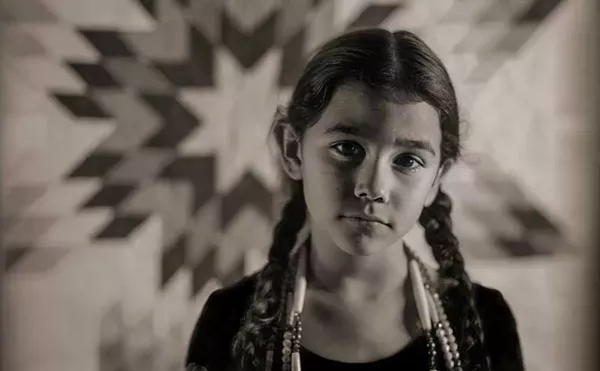
Audio By Carbonatix
[
{
"name": "GPT - Leaderboard - Inline - Content",
"component": "35519556",
"insertPoint": "5th",
"startingPoint": "3",
"requiredCountToDisplay": "3",
"maxInsertions": 100,
"adList": [
{
"adPreset": "LeaderboardInline"
}
]
}
]
Though Detroit will never have the sparkling lights of Broadway or the bustle of Chicago's State Street, there's a theater culture just waiting to be found in the far-flung corners of the city. That includes a number of long-established stages, such as the University of Detroit Mercy Theater Company's presentations at Marygrove College Theatre, where the company has been mounting quality productions for 36 years.
Part of its longevity may come from the University of Detroit Mercy's Theatre Company's use of students and veteran performers who aspire to higher standards than the average college production. The responsibility for staging, designing and directing falls to the school's students, staff and faculty, with guest artists invited to round out the casts. As the theater's business manager Courtney Burkett explains, the reasons for this are practical and artistic: "We like to do age-appropriate casting. Where most university productions would cast 19- or 20-year-old kids as senior citizens, we will have an actual 60-year-old, which also gives the students the experience of working with a seasoned professional."
That allows for the selection of more mature and challenging plays among the four presented each year. Those always include an American classic, a musical and a Michigan premiere. This year's Michigan premiere is David Ives' Polish Joke.
Ives' play is a satire that chronicles one American's attempt to re-establish his lost European roots. Growing up in white bread America has disconnected him from a sense of self, and so — a lot like Woody Allen's famous identity-free title character in Zelig — he becomes a sort of cultural chameleon, trying on a variety of ethnic identities. As Burkett says, "Hilarity ensues."
There was a fair amount of controversy on campus surrounding the production choice. Most of the contention stemmed from the play's title, which sparked fears that the theater company was insensitive to hackneyed stereotyping, but Burkett wants to set the record straight. She insists that the show is not attempting to degrade Polish culture but instead, "embraces it and celebrates it." Despite the complaints, the show received the blessing of the administration.
"The institution has been incredibly supportive of this piece, the redeeming quality of it and our right to perform it ... and also, it's very funny," Burkett says.
Polish Joke is anything but insensitive, Burkett says: "A big part of the choosing of this show was to reach out to the Polish community, which includes many cast [members] and part of the production staff. I mean, our lead actor's name is David Kowalczyk. You can't get much more Polish than that."
Of course, controversy could have easily been avoided by a blander selection, say the umpteen millionth production of The Music Man or Our Town. But the staff and students of the company believe that dealing with social, racial and class issues doesn't just make for more arresting drama, but is part of their objective as an educational program, and part of their role as artists.
The company will wade right back into dangerous waters with the upcoming production of Malice Afterthought: The Sweet Trials — the story of African-American physician Ossian Sweet, who in the 1920s was tried for murder in the aftermath of defending his Detroit home from a white mob — written by U-D faculty member Arthur Beer 20 years ago. Then in the spring comes an ambitious staging of Urinetown, a wild, absurdist musical satire that started on the cult fringe and ended up a three-time Tony winner in 2002.
As far as Burkett is concerned, controversy is par for the course, and it's not a bad thing: "I think that's something we aren't afraid of, telling stories and to tell stories that other people might be shy of doing, but it's our duty as artists to keep exploring."
Polish Joke opens Friday, Nov. 17, at Marygrove College Theatre, 8425 W. McNichols Rd., Detroit; 313-993-3270. Runs Friday-Sunday until Dec. 3.
Corey Hall is a freelance writer. Send comments to letters@metrotimes.com




